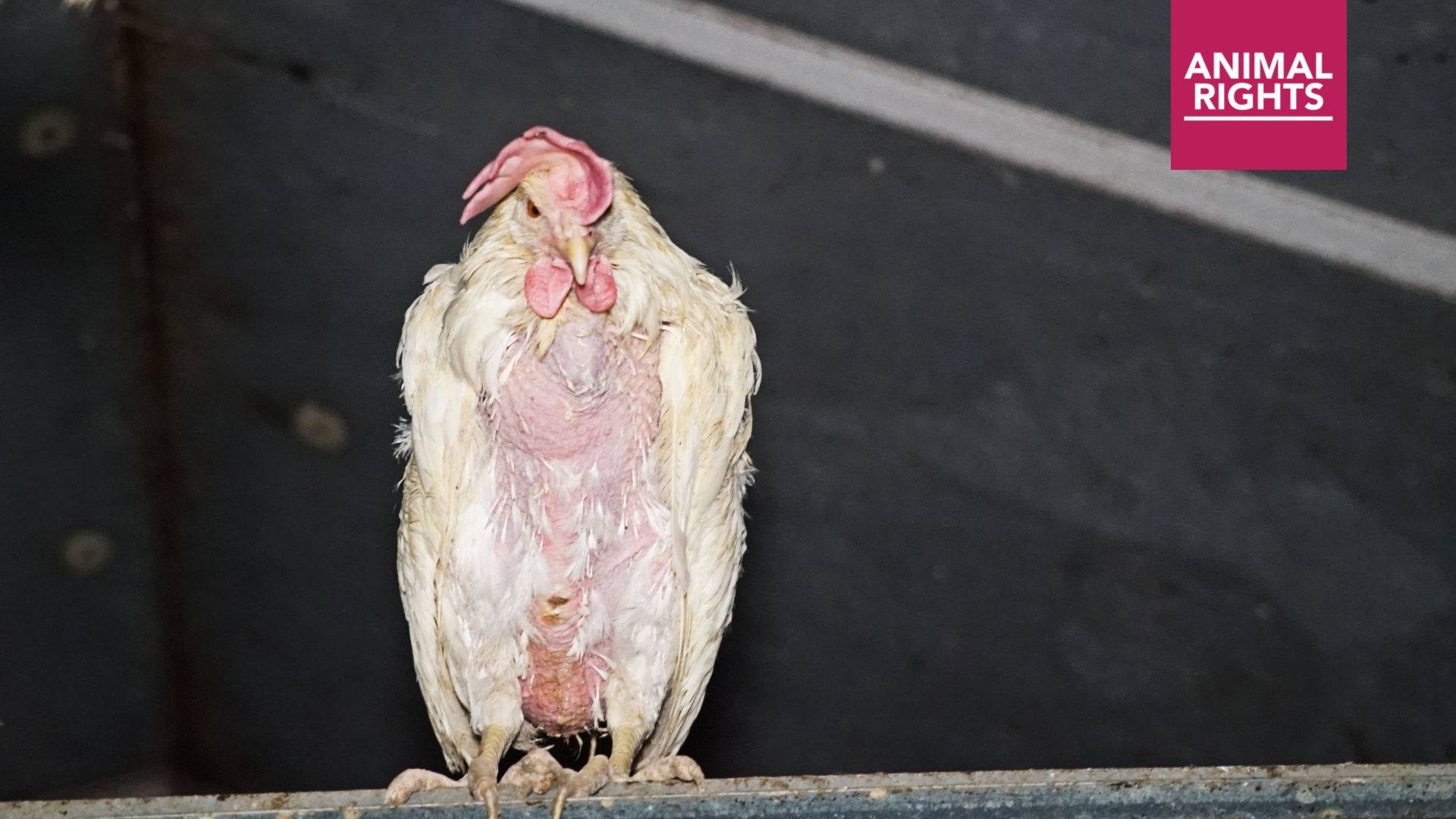يقوم الحزب من اجل الحيوانات بنقاش كبير حول معاناة الحيوانات في صناعة الماشية
On the Party for the Animals’ (PftA) insistence a big debate will be held in the Dutch Lower House on the suffering and dying of animals in the livestock industry. PftA’s parliamentary leader Esther Ouwehand: “A radical change of course is needed, involving a transition to an agriculture in which we do justice to animals.”

A chicken in a Dutch “horror stable” (picture by Animal Rights)
The debate will be held on the 24th of January next. The Dutch Party for the Animals wants to use this debate to force the Minister of Agriculture and colleague politicians to take a good look at themselves: when is the line crossed in terms of animals suffering in the livestock industry?
Several reports show structural malpractices in Dutch livestock farming. Last week it appeared that sows are so severely overbred to farrow as many piglets as possible that millions of piglets are suffering badly in the maternity barn. Ten years ago, the sector promised to push back piglet mortality, but those figures only grew after that. Additionally, the air in pig barns is so poisonous that more than half of the pigs in the Netherlands catch pneumonia.
The animal rights organisation Animal Rights recently published a series of videos of Dutch barns. Those prove that the reality for animals is completely different than what the livestock industry, supermarkets and government make it look like: bald and weakened chickens, which can hardly walk, among dead species in barns. Piglets and their mothers live above their own excrements on a concrete slatted floor in unfurnished, often dirty cages. The Association of Dutch Veterinarians ‘Caring Vets’ confirms that these type of practices are no exception but normal in everyday life in the livestock industry.
Esther Ouwehand of the Party for the Animals wants to have some crucial questions answered in the coming debate: “The key question is: How can those practices be legal? The follow-up question is: If this is legal, why are people not allowed to see it? Certainly if you make the customer responsible, you have the duty to inform them truthfully and completely about where their animal products come from. For that reason, the Minister must 1) acknowledge that there is a gigantic gap between the picture presented and reality in livestock farming and 2) to distance herself from the tactics of the sector to criminalise messengers such as Animal Rights. The right to information is a core value in a democracy.”
عند إصرار حزب من أجل الحيوانات (PvdD)، هناك جدل كبير في مجلس النواب الهولندي حول معاناة وموت الحيوانات في صناعة الماشية. زعيم حزب من أجل الحيوانات إستر أووهاند (Esther Ouwehand): “نحن بحاجة إلى تغيير جذري في الاتجاه والانتقال إلى الزراعة حيث ننصف الحيوانات.”

النص حسب الصورة: دجاج في “مستقر رعب” هولندي (صورة من حقوق الحيوان – Animal Rights)
ستجري المناقشة في 24 يناير المقبل. اضافة الى النقاش، يريد الحزب الهولندي من أجل الحيوانات من وزير الزراعة وزملائه السياسيين التشاور مع أنفسهم: متى يكون التدبير الآن كافياً عندما يتعلق الأمر بمعاناة الحيوانات في صناعة الماشية؟
تظهر عدة تقارير أن هناك انتهاكات هيكلية في تربية الماشية الهولندية. كما اتضح في الأسبوع الماضي أن الأبقار قد أثيرت بطريقة مروعة لتقذف أكبر عدد ممكن من الخنازير الصغيرة، فهناك ملايين الخنازير التي تموت في العقد المتأخر. قبل عشر سنوات، وعد القطاع بعكس معدل وفيات الخنازير، لكنه ازداد فقط بعد عشر سنوات. بالإضافة إلى ذلك، فإن الهواء الموجود في حضيرة الخنازير شديد السمية بحيث أن أكثر من نصف الخنازير في هولندا مصابة بالتهاب رئوي.
منظمة حقوق الحيوان نشرت مؤخراً سلسلة من الصور من الاسطبلات الهولندية. مما يجعل من الواضح أن واقع الحيوانات مختلفة تماما عن قطاع الثروة الحيوانية والسوبر ماركت والحكومة للحفاظ على المستهلكين: الدجاج العاري والضعيف، الذي بالكاد قادرا على المشي وبين الأنواع الميتة في الإسطبلات. الخنازير يعيشون فوق برازهم على أرضية مضلعة في أقفاص عارية وقذرة في أغلب الأحيان. المنظمة البيطرية كارين فات (Caring Vets) تؤكد أن هذه الأنواع من الممارسات ليست استثناءات، ولكنه إجراء عادي في صناعة الثروة الحيوانية.
تريد إستر أووهاند من حزب من أجل الحيوانات الإجابة على عدد من الأسئلة الحاسمة في النقاش القادم: “السؤال الرئيسي هو: لماذا هذه الممارسات قانونية؟ السؤال التالي هو: إذا كان هذا قانونيًا، فلماذا لا يستطيع الناس رؤيته؟ خاصة إذا كنت مسؤولاً عن المستهلك، عليك واجب توفير معلومات صادقة ومتكاملة حول مصدر منتجاتها الحيوانية. يجب على الوزير أن 1) يعترف أن هناك فجوة كبيرة بين تصور الناس ويعقد واقع في الثروة الحيوانية و2) يسلب تكتيكات هذه الصناعة مثل تجريم حقوق الحيوان (Animal Rights). الحق في الحصول على المعلومات هو قيمة أساسية في الديمقراطية.